Profile
Meet Korkor & Jerry: The developers working to solve teacher absenteeism

Software and application development is one of the fast growing areas in the technology industry and more young people continue to bring out the creativity in them in this regard.
Last weekend, about 30 trainees who had acquired skills in software development converged in Accra to showcase mobile and web applications they had designed to tackle specific issues across different sectors.
Some of the applications demonstrated included: ‘Alodie’ an application that allows people to send money into mobile money accounts without using USSD codes; ‘FundFair’ which connects low income earners to donors to allow them pay off medical debt; ‘Sparky’— a platform that connects start-ups to investors; ‘Go Legal’ — designed to connect clients to lawyers, and many other applications which are not yet available to the public.
Another which could be of immense benefit to stakeholders in the education sector, is a mobile application intended to solve teacher absenteeism. The developers, Korkor Mensah and Jerry Gasu, spoke about their inspiration for the project and the prospect of the innovation they were looking forward to implementing fully.
Application
The partners in an interview with The Spectator said they took up the initiative because “the absence of teachers tends to negatively impact teaching and learning in schools.”
“Teacher absenteeism affects the confidence of parents and leads to low turnout of students so we decided to build an application that does a real time tracking of the teacher’s presence or absence,” the duo noted.
The application, according to the developers, “allows a teaching staff to scan a Quick Response (QR) code with his or her mobile phone and logs in with identification (ID) which has already been generated for him or her.
“After the teacher successfully logs in, he is automatically seen on a dashboard that is monitored by the administration of the school. The application then records the number of teachers who reported on time, those who reported late as well as those who did not show up at all,” they explained.
Collaboration

Ms Mensah is a Quality Assurance Test Analyst at Ecobank. In her role, she ensures that mobile and web applications and systems “are tested to ensure they are fit for purpose or do not have any defects.”
She had enrolled her two children at Codetrain, a Ghanaian tech company that trains individuals to become software developers, but was compelled to eventually take up the course and acquire the skills herself.
Jerry, on the other hand, started teaching himself how to code at home but realised there was more to learn beyond the self-taught approach he had adopted and, therefore, signed up to the structured courses that were being offered by the institution.

It was during the one-year intensive training at Codetrain that they both decided to work together on the teacher absenteeism application which they hope to fine-tune and make available to schools across the country.
“This is a demo and we have not rolled it out on full scale. We are open to other ideas and collaboration because this [application] solves a social problem. Our hope is to be able to roll out to schools in Ghana and possibly across Africa.
“If teachers are absenting themselves from classes then we will never get the quality education we want to give our children so this application is going to solve a challenge in the education system and we hope to partner other organisations to make this a reality,” Ms Mensah said.
Beyond Codetrain, Jerry intends to start his own business and continue to solve “real world problems” with his expertise.
Insight
The partners admitted that there were other applications that dealt with absenteeism but this did not stop them from coming up with their own innovation or solution.
“We know other well-established organisations have applications they use internally to track attendance of staff but in our research we do not think teachers are scanning QR codes to log in their attendance; they still make use of a notebook or a register.
“There are other applications solving the same problem but there is never a single solution to a problem. We decided to focus on the educational sector because we know ours will be unique,” Ms Mensah stated.
She was one of the few females among the graduating cohort. She said her aim of becoming a Quality Assurance Engineer in future would require programming skills hence the decision to join the course at Codetrain which she described as insightful.
“I work closely with application developers; the developers make the application, then my role is to test it. So I believe the skills I have now would help me to become a good Test Analyst.
“A year ago, I did not know how to code, I could not write a single line of code. My 10-year-old son brought a coding assignment home and I could not help him. I was really embarrassed and felt I had let my son down so weeks later I enrolled at Codetrain and a year down the line, the journey has been rewarding,” Ms Mensah recounted.
The developers encouraged individuals to sharpen their technology skills and explore the opportunities as well as solutions they could provide within the sector.
Ms Mensah advised young women to aspire to fill the existing gap in the technology industry while Jerry also urged aspiring software developers to be patient and remain focused because their efforts would eventually yield results.
Profile
ROFAC creating safer communities within Ada, Madina-Adenta enclave
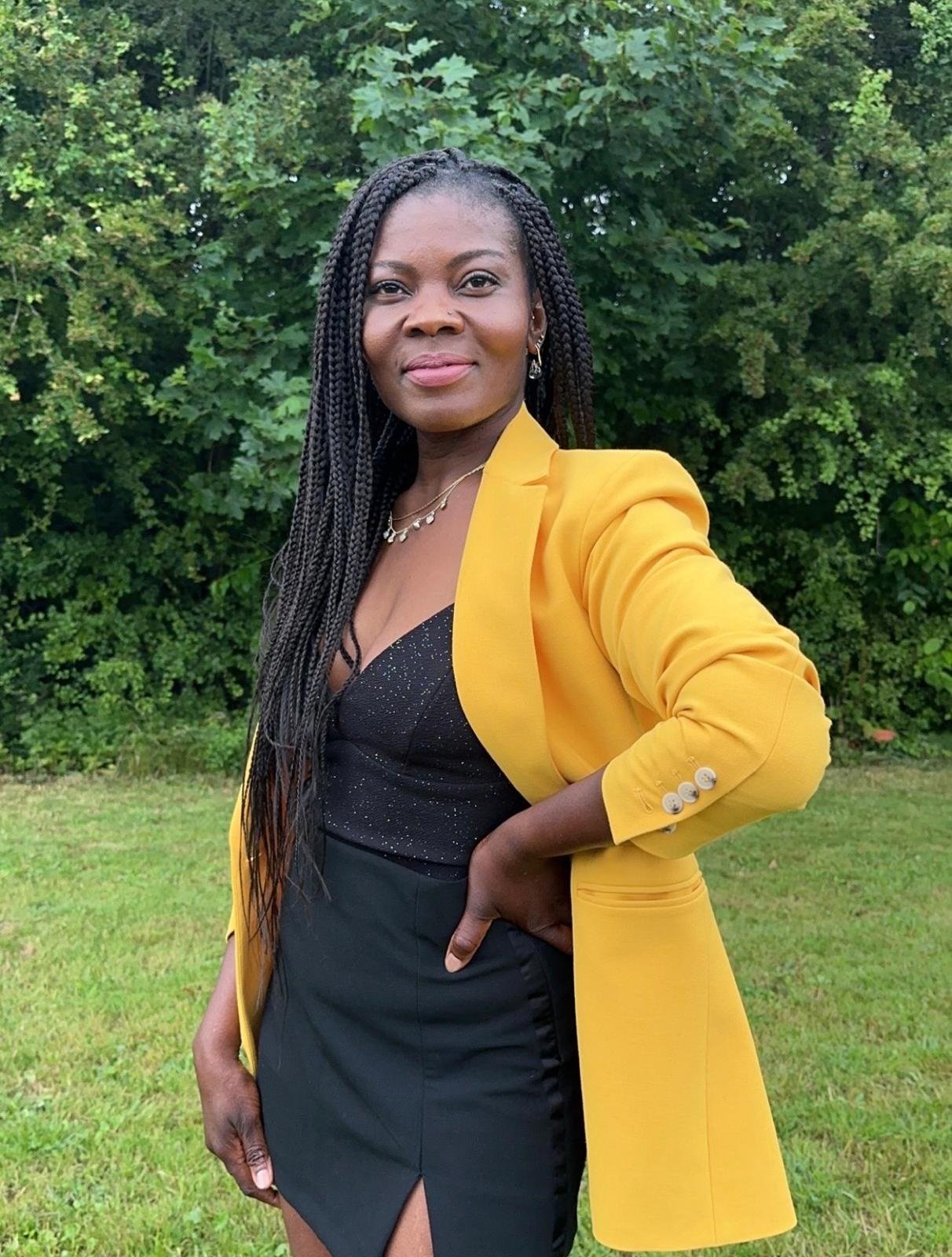
The infectious smiles and beaming grin on the faces of children is one of life’s greatest joys. It also has a way of brightening even the darkest days.
Most children have their smiles dimmed because their parents have no means of providing them with their basic needs and rights.
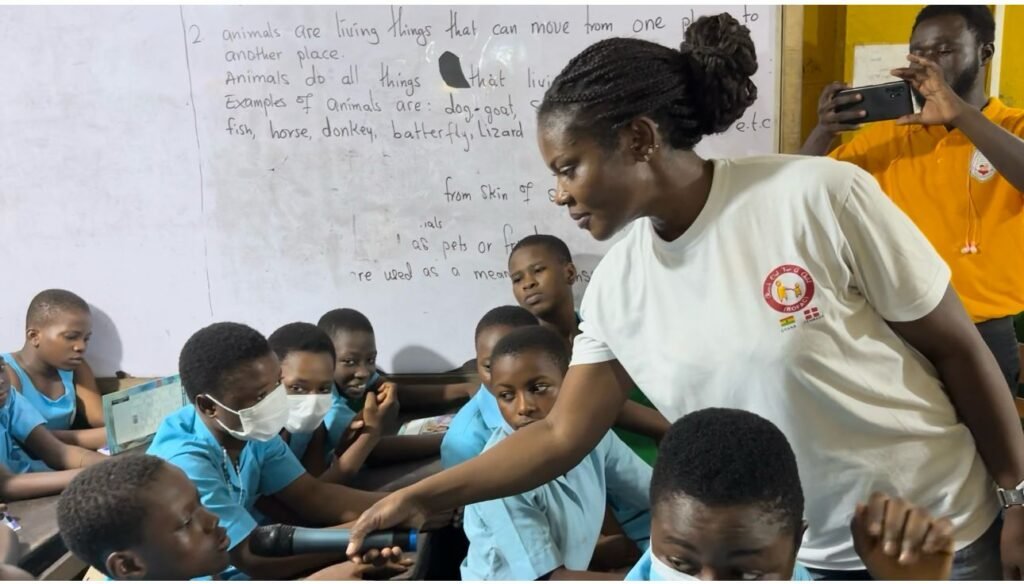
While some have lost their childhood to struggles of life, others have lost it to the cruelty of abuse, neglect and harsh realities of poverty.
Helping bridge the gap by putting smiles on faces of less privileged children, Reach out for a Child (ROFAC) is gradually becoming a household name in the Greater Accra Region, especially within the Ada and the Madina- Adenta enclave.
With the aim to improve education, healthcare, and facilities for the underprivileged group in Ghana, ROFAC believes that by improving school infrastructures, learning will be attractive to children, thus increasing attendance and providing a pleasant and safe learning environment.
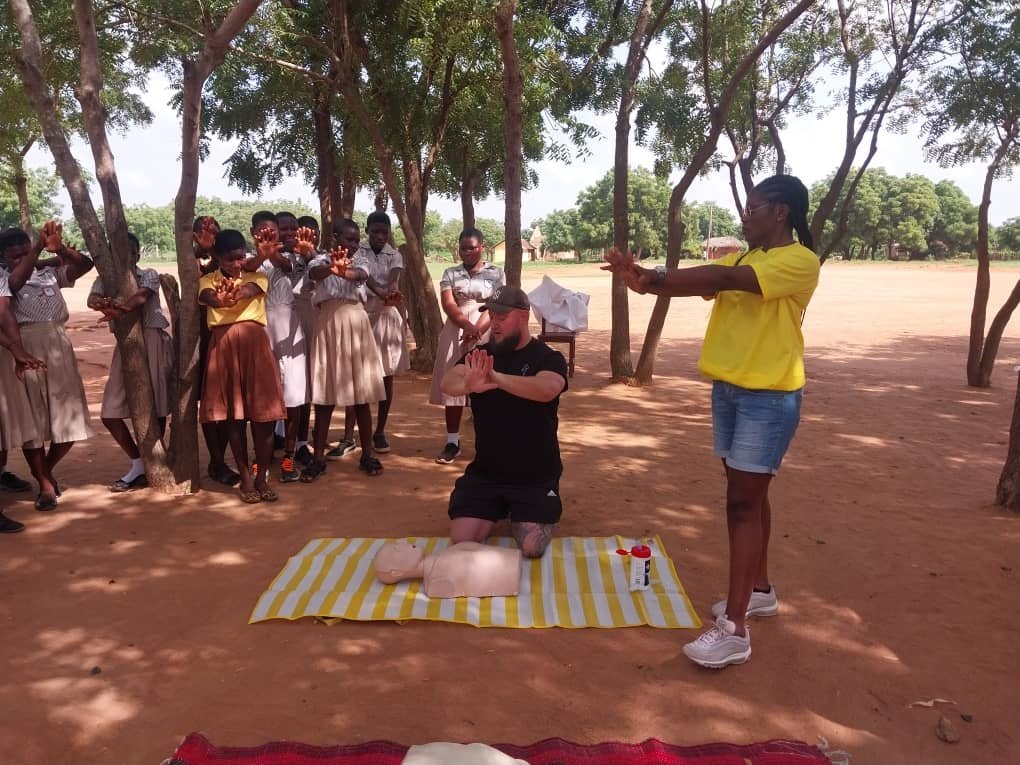
Yvonne Mawufemor Pedersen is an Acute & Emergency Care Nurse (RN, BSN), working in one of the first and largest super-hospitals in Denmark.
How it started
Life in Denmark is far from life in Ghana, where Yvonne grew up.
In 2008 while living in Denmark, Yvonne watched a “United Danish Appeal For Funds” program on television, raise funds to support third world countries, targeting all countries that appear on “The Organization For Economic Cooperation and Development” (OECD), list of third world countries, Ghana was on the list. The television program lit a fire of curiosity in me, but also a level of rage of helplessness.
Growing up in Ghana I knew of some of the challenges some children were subjected to, having to skip school to sell on the streets and in markets to help support the rest of the family. Some, runaways due to domestic violence and abuse. Inadequate infrastructure in most schools didn’t make school attractive either.
I have always had the drive of “Florence Nightingale” I wanted to do something. I wanted to contribute to shifting the narratives of the less privileged. These, and the television program I saw in 2008, contributed to a visit to Ghana, earlier than planned.
The Charity
Reach Out For A Child- (ROFAC) is a small Danish registered charity, started in 2009 by Yvonne Mawufemor Pedersen, a Ghanaian/Togolese resident in Denmark.
The charity was initially formed to raise funds for street children and head potters, after being inspired by a trip while visiting family in Ghana, and sourcing out how to shift the narratives of the above-mentioned group of people. As a result, ROFAC, Ghana was established in the same year, now our partner in Ghana.
Astonishingly, the original target funds were exceeded, and we decided to expand our support to single mothers. We started to raise funds to support the target group, meeting them in the rural areas before their migration to the capital.
As our understanding of rural communities in Ghana grew, so did the scope of our projects, because we understand, there are many factors that contribute to getting a child off the streets and into a classroom, therefore we expanded further to supporting hospitals and schools in rural Accra with teaching aids, hospital equipment’s and giving health education.
As well as lessons in first aid and CPR. This not only includes knowledge to our direct beneficiaries alone, but also that of their families and wider community.
We also, in partnership with our local partners, tailor internship programs for nursing students from Denmark to Ghana.
Our project and since 2009, ROFAC has helped many families in various communities through our numerous projects, and we are determined to ensure that this continues despite challenging circumstances we sometimes encounter.
Through her initiative, ROFAC has over the years, donated school furniture and writing boards for teachers and pupils at the Nuhalenya D/A Primary School in the Ada district, explaining that the organisation has been part of the growing process of the school since the year 2018 for which the head teacher, Mr Narh, together with teachers and some opinion leaders had always expressed their gratitude to the team.

School practicing how to resuscitate
Speaking to The Spectator in Accra last Thursday, Ms Pedersen said the organisation has also begun teaching Cardiopulmonary Resuscitation (CPR) in some basic schools, including Nuhanenya in Ada District and Pauline Queensland schools at Agbogbloshie in the Greater Accra Region to equip young learners with essential skills that can help save lives during cardiac emergencies.
CPR is a lifesaving emergency procedure performed when the heart stops beating.
Introducing the CPR programme in the basic schools, she indicated would not only empower the children with practical knowledge but also promote a culture of safety and responsibility.
In this cause, ROFAC has been advocating the subject matter to teach students the basic steps of CPR, including chest compressions and rescue breaths.
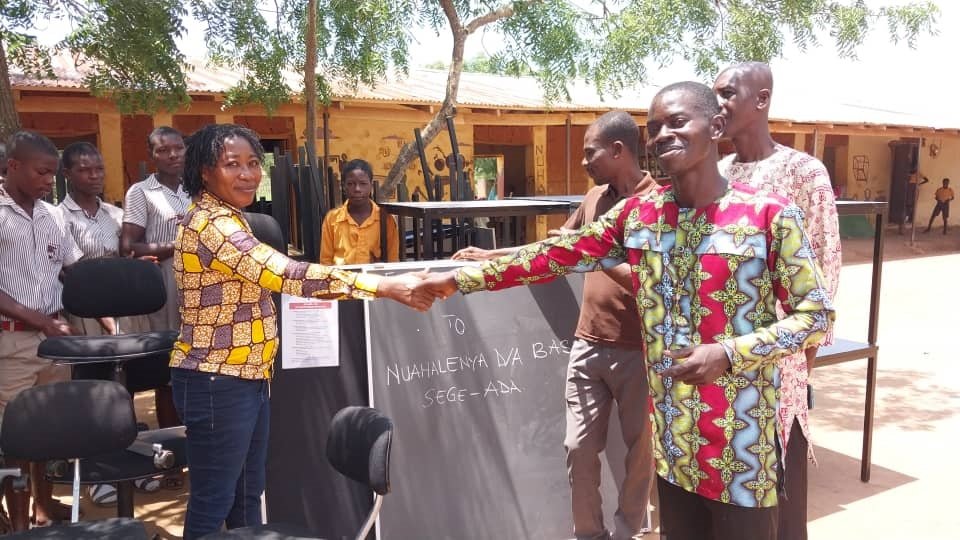
She mentioned that to educate children on recognising emergencies and the importance of seeking adult help will increase awareness of heart health.
As part of the safety measures, ROFAC has also introduce the idea of using child friendly mannequins for the learners to practice chest compressions and breathing techniques under the guidance of medical trainers.
The programme, she said, emphasises on safety, including how to avoid panic and handle emergency situations calmly. The schedule for subsequent teaching children CPR will potentially assist in saving lives within their families and communities.
“Implementing a CPR programme in basic schools is a valuable investment in public health and safety. It empowers students with essential life-saving skills and fosters a sense of responsibility and confidence. By integrating CPR education into the curriculum, schools contribute to building safer communities,” she explained.
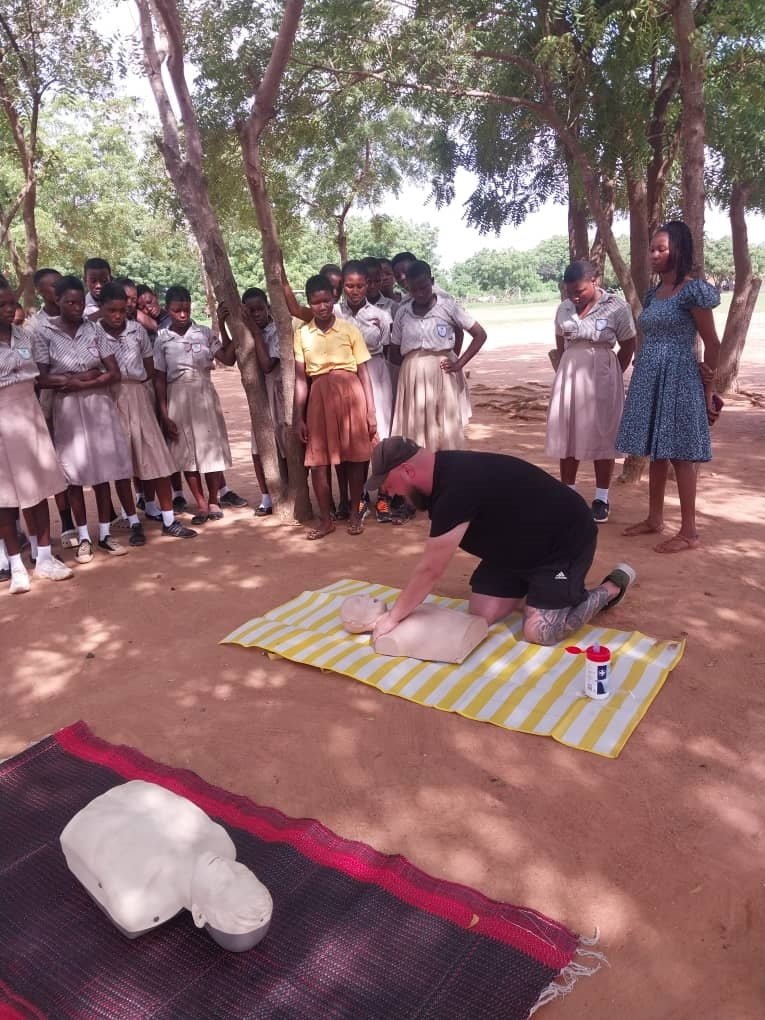
Ms Pedersen further indicated that the programme not only prepares children to respond to emergencies but also cultivates a generation of informed and proactive individuals.
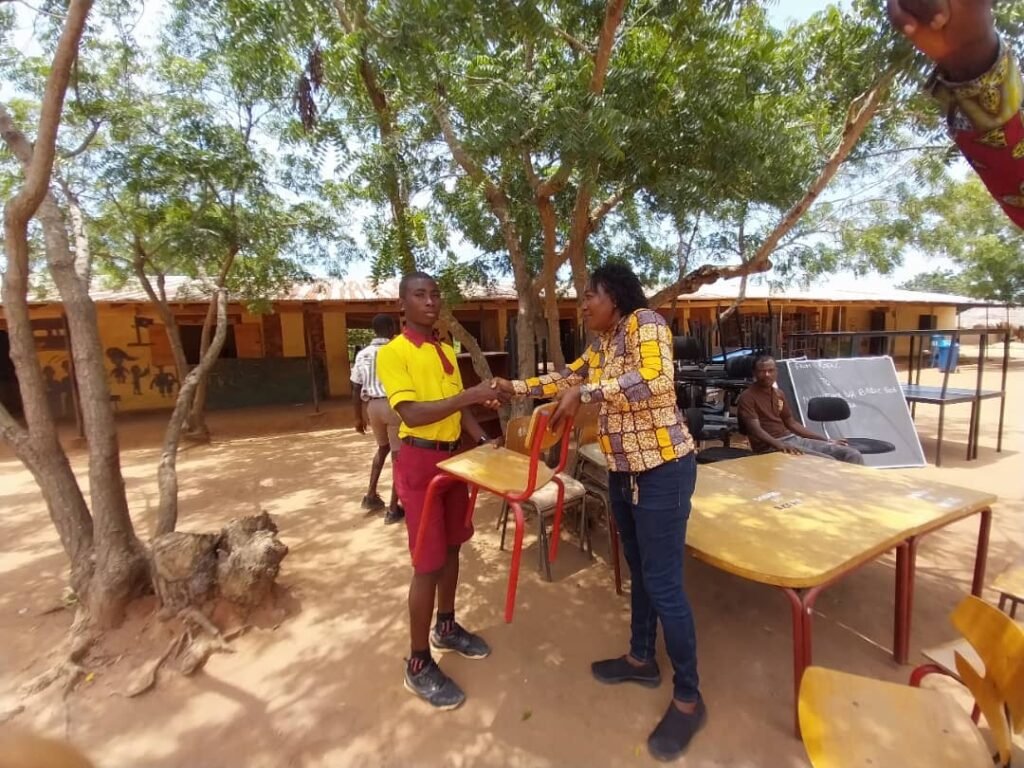
ROFAC also embarked on another project by donating a laboratory incubator to the Duala Medical Clinic based at Burma Camp in Accra.
This follows a request made by the medical doctor in charge, Dr Awura Adjoa Nunoo, for the equipment for services at the facility.
By Lawrence Vomafa-Akpalu
Profile
From passion to plate: Chichi Yakubu’s culinary journey

Driven by her personal weight loss journey and passion for healthy eating, Chichi Yakubu has carved a niche for herself in the culinary industry.
Her dedication and commitment has turned her business, NyoNyo Essentials, to one of Ghana’s most sought-after catering companies in the country.
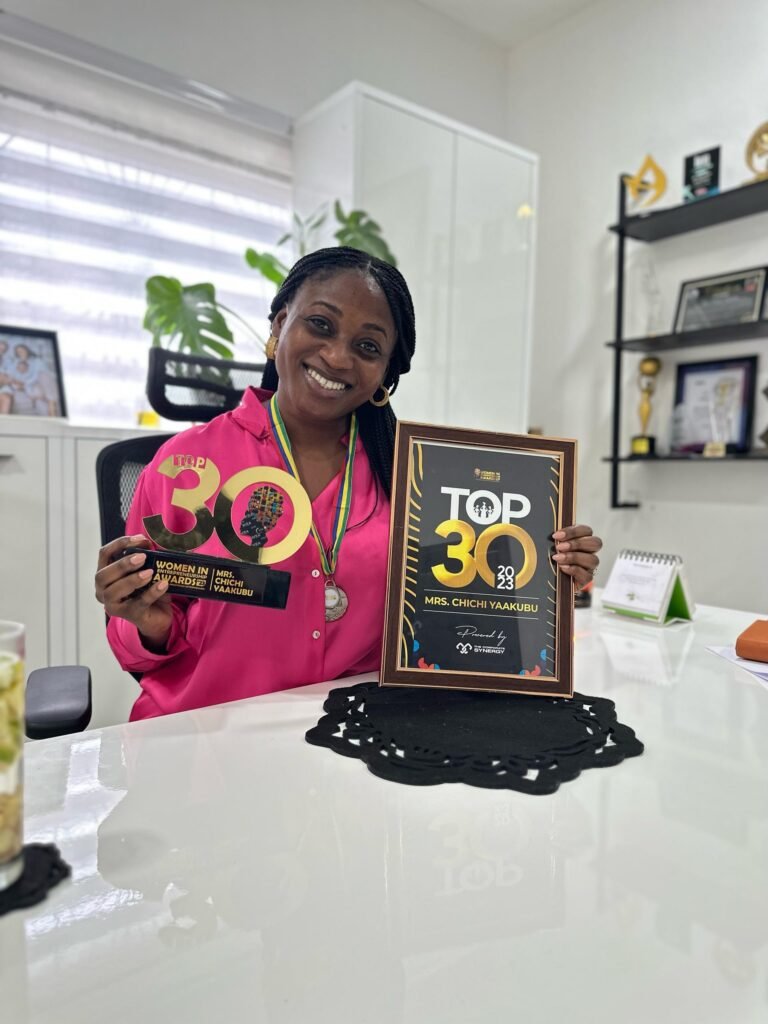
Born to a Nigerian father and a Ghanaian mother, Chichi grew up in a family of passionate women at Mamprobi Polytechnic.
Her mother, an avid cook, started a small catering business, which Chichi helped manage during vacations.
“From upper primary through to Junior High School, I will close from school to go and help my mother at her small food stand at Sakaman to do the dishes after her customers had eaten.
Her mother was known for her special dough Banku with Okro soup. Her small food joint expanded to become a chop bar where she worked at when on vacations.

She acknowledged that, “this early exposure to entrepreneurship sparked my interest in the culinary industry.”
After her university education, Chichi embarked on a weight loss journey, which led her to explore the culinary side of things.
According to Chichi, her weight loss journey began after she realised in her late teens her family struggle with weight.
“I wasn’t going to just allow it but someway, somehow, I started gaining so much weight in my early twenties and I decided to take action by changing my lifestyle by eating healthy and exercising. That’s what got me interested in meal prepping which eventually became my side hustle,” she narrated.
Chichi later discovered the business potential of healthy food and decided to pursue it. Also her friends were curious about her weight loss strategies, which inspired her to offer meal-prep services at a fee.
With a bold vision and determination, Chichi started small, offering sandwiches, salads, and smoothies.
Leveraging social media marketing, she reached a wider audience and grew her business rapidly.
Today, Chichi is the Chief Executive Officer of Nyonyo Essential, a business that has expanded to cater for weddings, parties, and corporate events with her team providing excellent service, and word-of-mouth referrals have helped her expand her client base.
Again, Chichi has also opened kitchen centres in selected areas, providing healthy food options to Ghanaians.

She mentioned that, her mother has been her number one supporter saying “she had the blue print handed down to me. I started my business in her kitchen, and she also spared me some of her workers when the new people I had hired didn’t show up.
“My then boyfriend and now husband believed in me even when I was not sure to do it full time as I was in corporate Ghana and not doing bad.”
Chichi said one of her biggest challenges was staff retention, adding that she was of the opinion that the work itself was not much of a challenge but the people.

The other thing was stereotyping, saying that, “some years back people look down on food business operators, we were not regarded as professionals with others assuming we are school dropouts or just people who don’t know what we are about.”
But I was determined to change that narrative by handling work with the outmost professionalism, which I have since the beginning of my weight loss journey in 2014.
Chichi is motivated by her faith in Christ, her passion for entrepreneurship, and her commitment to empowering women.
As a wife, mother, and business owner, she strives to create a balance that reflects her vision of an all-rounded woman.
In business, she emphasised, her drive comes from a deep love for the hospitality industry and a desire to help others succeed through the business of catering by NyoNyo, saying that, “My belief that Jesus is Lord guides my decisions, ensuring that integrity, excellence, and purpose shape both my life and business.”
She urged young people, especially young women, who are just starting out in their careers or entrepreneurial journeys to believe in themselves, trust God’s timing, and be willing to put in the work.

Moreover, she said “success does not happen overnight, so stay consistent, be patient, and keep learning. Surround yourself with the right people, mentors, peers, and a support system that challenges and encourages you.”
“Opportunities don’t pause for perfection. While we overthink, others take action. Start where you are, with what you have. The world moves fast—so should we,” – Chichi Yakubu advised
She again added that women should embrace their multifaceted roles without guilt saying “you can be an entrepreneur, a wife, a mother, and a sister’s keeper all at once. Most importantly, stay true to your values and never compromise on integrity. Let your journey reflect both purpose and excellence.”

Chicihi loves to spend quality time away from the noise of life in new places or go on an adventure with her family and friends.
She is a product of Christian home school, Okuapeman secondary, Central University College and Harvard University.
By Jemima Esinam Kuatsinu







